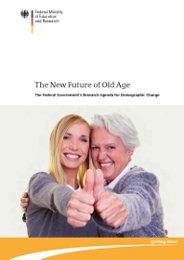Social Inclusion: Staying Mobile and in Touch
Mobility should never be a question of age. At any age, people want to move around in their environment as freely, safely and independently as possible – even if they should suffer from physical impairment. Equally important as the access to vital facilities are the contact and exchange with others. With new solutions for greater mobility, the Federal Government provides the necessary prerequisites. In combination with modern information and communication technologies, this helps us to ensure that people are fully integrated at an advanced age, and able to contribute their experience, knowledge and desires to society. In the process we also fund the development of germane business models, and apply suitable measures to ensure that seniors are able to confidently handle new technical devices, and make optimal use of them. This also applies to their self-determined behaviour as consumers that are faced with new legal regulations in the digital world, new product offers and new markets, as for example in the areas of telecommunication, health, or nursing care.
Mobile in the city
Anyone who wishes to lead an independent life needs room for manoeuvre – be it on foot, on the bicycle, in local public transport, or in the car. However, in many cities, towns and municipalities, seniors often experience difficulties to go shopping, reach their doctor’s practice or a restaurant on their own and without encountering barriers. We foster this mobility in the personal environment, which is an essential element in everyday life, by paying particular attention to the needsof the older generation in the further development of transport infrastructures. In this process, we also examine how road safety, but also ability of older people to move and orient themselves can be supported with hi-tech aids, for instance by the utilization of technical and personalized escort, guidance, or navigation systems. Our efforts are aimed at the provision of intelligent and barrier-free mobility offers and infrastructures that are customized to the specific requirements of older people, but also efficient and affordable.
Comfortable and safe in the car
Our fitness to drive often decreases with advancing age. We have the objective to enable older people to move safely in roadtraffic. Assistance systems in the car can help compensate physical deficiencies and a lack of confidence in one’s own driving skills. We therefore promote the further development of assistant technologies in these areas in order to specifically adapt them to the requirements of older people.
Uncomplicated travel in local public transport
Public transport and private transport providers are not only a good and resourceefficient alternative to driving in one’s own car; they are most of all an indispensable element in the self-determined everyday life of many seniors. We are therefore engaged in the development of technical systems and intelligent services in local public transport that adapt to the wishes and capabilities of the older generation. This includes individual route planning and a flexible combination of scheduled services, customized dial-abus services, and transport services to the front door, which can be used in a safe and comfortable way even in the case of physical limitations.
Well-informed on travels
Seniors’ mobility is higher today than ever before, and they do not always stay in their familiar surroundings. We enhance information and communication technologies in a way to ensure that older people are able to make use of their intuitive orientation when travelling far off their familiar routes – despite unfamiliar situations, languages, or means of transport. As soon as the navigation becomes easier, confidence levels also rise, enabling seniors to further expand their sphere of action.
Always properly connected
People with social contacts retain their fitness longer and can also provide others with input and support. Physically disabled seniors or seniors that live by themselves are also in the position to do so, if they use modern information and communication technologies. Chatting with their families, friends or doctors while even being able to see them on the monitor, informing themselves about theday’s current events, or meeting one another in networks are all ways of staying in touch. In this respect we intend to develop easier means of access that are aligned with individual requirements and the technical skills of their users.
Reliability, also in rural areas
Demographic change will impact individual regions with different magnitudes at different times. In rural areas where distances are greater and infrastructures sparser, we work with regional players to ensure the continued provision of primary care with local service offers. In a combination of individually customized services and close-to-home proposals we thereby improve the opportunities of seniors regarding mobility and their inclusion in social life. We create the conditions that are necessary for the development of multifunctional drop-in centres, which ensure the provision of old age care by way of personal support and with the assistance of teleservices. Typical everyday activities such as dealing with the authorities, mail, medical care or purchase orders can therewith be attended to at one central location.


